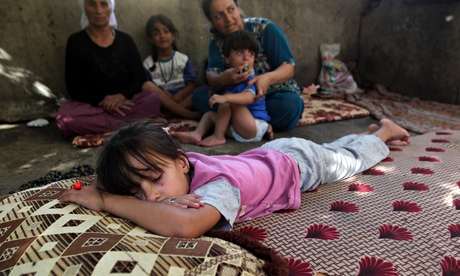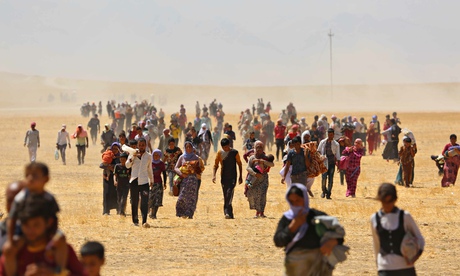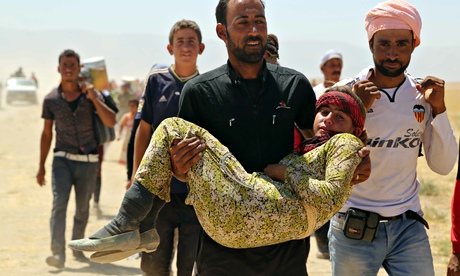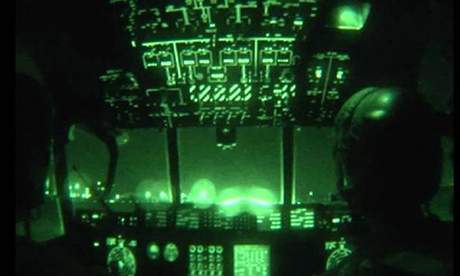
Iraqi Yazidis in a building where they found refuge in the Kurdish city of Dohuk. Photograph: Ahmad Al-Rubaye/AFP/Getty Images
The United States is exploring options to evacuate thousands of Iraqi civilians trapped on a mountain in northern Iraq by Islamic militants after four nights of humanitarian relief airdrops, officials in Washington said.
At least half of the 40,000 people besieged by jihadists on Mount Sinjar had escaped by Sunday night, aided by Kurdish rebels who crossed from Syria to rescue them.
But proposals for a mission to save the remaining thousands of Yazidi people underscore the limits of the airdrops, ordered last week by Barack Obama.
"We're reviewing options for removing the remaining civilians off the mountain," deputy US national security adviser Ben Rhodes told Reuters late on Sunday.
"Kurdish forces are helping, and we're talking to the (United Nations) and other international partners about how to bring them to a safe space."
The refugees, all members of the Yazidi sect, began streaming back into Iraqi Kurdistan on Sunday after a perilous journey past Islamic State militants who had vowed to kill them and had surrounded their hideout on Mount Sinjar after storming the area.
The day-long trek took them first over a mountain range into Syria, then through the Peshkhabour crossing three hours north-west of Irbil, where Kurdish officials were rushing to provide food and shelter.
Fleeing Yazidis said their escape had been aided by the YPG, a Syrian Kurdish rebel faction, and by US air strikes on Islamic State (Isis) positions which had forced the jihadists to withdraw for around six hours on Saturday.
Their retreat gave a window for thousands of Yazidis, all desperately low on food and water, to begin streaming down the mile-high mountain and north across the Nineveh plains, which have been an ancient homeland of Iraqi minorities.
The past week has uprooted Yazidis, Christians, Turkmen and Shabak Shias from lands in which they had lived for several thousand years, in a near-fatal blow to Iraq's pluralist past. Thousands are now sleeping rough in public spaces near Duhok, while others have reached Yazidi villages further to the south, where starved hordes, many in tattered clothes, were carrying plastic bags containing all they could salvage from their homes as the jihadists rampaged towards them.
 Thousands of Yazidis trapped in the Sinjar mountains as they tried to escape from Islamic State forces, are rescued by Kurdish peshmerga forces. Photograph: Anadolu Agency/Getty Images
Thousands of Yazidis trapped in the Sinjar mountains as they tried to escape from Islamic State forces, are rescued by Kurdish peshmerga forces. Photograph: Anadolu Agency/Getty Images
Though many Yazidis have now reached safety, the siege of Mount Sinjar is not yet broken; many thousands more are thought to remain on the southern side of the 60-mile-long ridge, unable to reach the safe passage that the Kurdish fighters had secured towards the Kurdish north.
The US military confirmed it had carried out four air strikes on Islamic State positions on Saturday. Britain said it had airdropped food and water to those still trapped. Iraq and Turkey, along with the US, had also delivered aid. However, Yazidis said much of the food and water dropped by the US using parachutes had disintegrated when it hit the ground.
On Sunday, a Kurdish official told Reuters that Kurdish forces had taken back two towns in northern Iraq from Isis militants. Hoshiyar Zebari, who claimed the forces had been supported by the US air strikes, said theKurds had recaptured the towns of Guwair and Makhmur. Asked how long the US would have to continue strikes to help the Kurds defeat Isis, Zebari said: "As President Obama said, there is no time limit."
Barakat Issa, a Yazidi who arrived in Iraqi Kurdistan on Saturday, began his journey before the mass exodus, when Kurdish guerrillas were still trying to secure a route.
"It's beyond a catastrophe," he said. "We were escaping death and heading to another death. There was a three-year-old child with me that had to walk eight hours non-stop in very rough terrain.
"The journey was impossible. Difficult is not even close to describing it. There are two more Yazidi villages still besieged – the people couldn't leave and Isis gave them a deadline that ends very soon to convert to Islam or to face the sword. Even if they convert to Islam Isis would force the men to join their fighters and give their women to them."
Yazidis who have fled to Irbil say at least 400 women and children have been captured by jihadists who have taken some to Syria and others to Sinjar. Western officials believe some are being held in schools near the border and are facing demands to convert to Islam. The Islamic State believes Yazidis to be devil worshippers and has vowed to kill those who do not convert to Sunni Islam.
Despite the clear danger, desperate hunger drove some of the men who escaped the mountain to attempt to steal food from jihadists along the way.
 Thousands of Yazidis previously trapped by Isis have been rescued by Kurdish peshmerga forces. Photograph: Anadolu Agency/Getty Images
Thousands of Yazidis previously trapped by Isis have been rescued by Kurdish peshmerga forces. Photograph: Anadolu Agency/Getty Images
"Many died of thirst," said Barakat Issa. "And at night some of the men would sneak towards the surrounding Isis-controlled villages and attempt to steal some cattle to take back to the hungry people, but this created an issue, because red meat makes you thirsty and it's very hard to get water in this mountain except for some remote parts that have groundwater."
Risalah Shirkani, a Yazidi woman who escaped to Duhok, in Iraq's Kurdish north, said: "This is not the first time this has happened to us. History is a witness to that. After this ordeal, Yazidis don't feel safe in Iraq, or even in Kurdistan any more. It's only a matter of time until we all leave.
"Some of my relatives were kidnapped by Isis. Others were beheaded and yet more fell off the mountain. There were pregnant women giving birth and children dying from dehydration, diarrhoea and fever."
Iraq's human rights minister, Muhammad Shia al-Sudani, estimated that around 500 Yazidis had been killed in the past week, many by jihadists when they stormed the city of Sinjar early last Sunday. Others, though, had died of dehydration and disease.
Unicef says at least 40 of the dead are children. The figures were impossible to confirm, but matched eyewitness tallies during the desperate days of deprivation on the mountaintop.
Issa Pajo, 27, who arrived over the weekend in the town of Duhok, near the Syrian border, said: "We have been on the way for two days until we reached Duhok. The Syrian Kurds treated us well – they gave us food. But we also have nothing here. We don't have a place to sleep and we have not seen any assistance from anyone. Isis destroyed everything. They killed my cousin and looted our houses."
Another man who made it to Duhok, Ghassan Salim, 40, said: "The situation is critical. It is a human catastrophe. The children are in particular need of urgent assistance. And it is not only Yazidis – all the minorities, like Shabbak, Christians … need desperate help."
Those who have been unable to leave Mount Sinjar face an equally perilous journey to reach aid, which according to Barakat Issa is being dropped on a peak that was used by the Iraqi and US militaries. "It was a US base and before that it was a missile base during Saddam's time, the same platform he used to launch rockets against Israel. That was the main drop-landing zone for the aid despite the fact that Isis are not deep in the mountains.
"The drops didn't reach more than 10% of those who need them. Helicopters and pilots were afraid to come close to the southern part of the mountain – thousands of people in that part received nothing."
 An RAF transport aircraft making the first airdrop of British humanitarian aid to refugees fleeing Islamist militants in Iraq. Photograph: Mod Crown Copyright/PA
An RAF transport aircraft making the first airdrop of British humanitarian aid to refugees fleeing Islamist militants in Iraq. Photograph: Mod Crown Copyright/PA
After more than a week of losing ground, and facing accusations that they had left the Yazidis to their fate, Kurdish forces on Sunday regained three villages 25 miles south-west of Irbil, which Isis fighters had been trying to seize.
Regular peshmerga fighters were vastly outnumbered by irregulars who rushed to the frontline carrying ageing Kalashnikovs. Waiting under the roof of a sprawling checkpoint, just over a mile from the frontline, Rashid Kherjari, a retired peshmerga fighter, said he had five sons further down the road.
"We have faced three big enemies in my lifetime," he said: Saddam's Ba'athists, the Iraqi prime minister, Nouri al-Maliki, and now Isis. "Maliki is the worst," he added. "But we are fighting against blind bats in these guys."
Jets rumbled through the sky in the middle distance and a slow trickle of injured were ferried by ambulance back from the frontline.
"We will win this battle," said another volunteer fighter, his belly hanging over his trousers. "All Kurds are peshmerga when it really matters."
After they had rolled unopposed through the Nineveh plains and advanced rapidly towards Irbil, the momentum of the jihadists slowed over the weekend. "The US airstrikes helped, but Isis remains potent," said the Kurdish regional government's former prime minister, Barham Salih.
Kurdish officials have urged the US to keep up its attacks on the Islamic State, claiming a short campaign could end up empowering the jihadists.
On Sunday the president of Iraqi Kurdistan, Masoud Barzani, asked the international community to provide the Kurds with weapons to bolster their battle against Isis, whose dramatic push through the north has alarmed Baghdad and western countries.
Speaking at a press conference with the French foreign minister, Laurent Fabius, Barzani said: "We are not fighting a terrorist organisation, we are fighting a terrorist state."

No comments:
Post a Comment